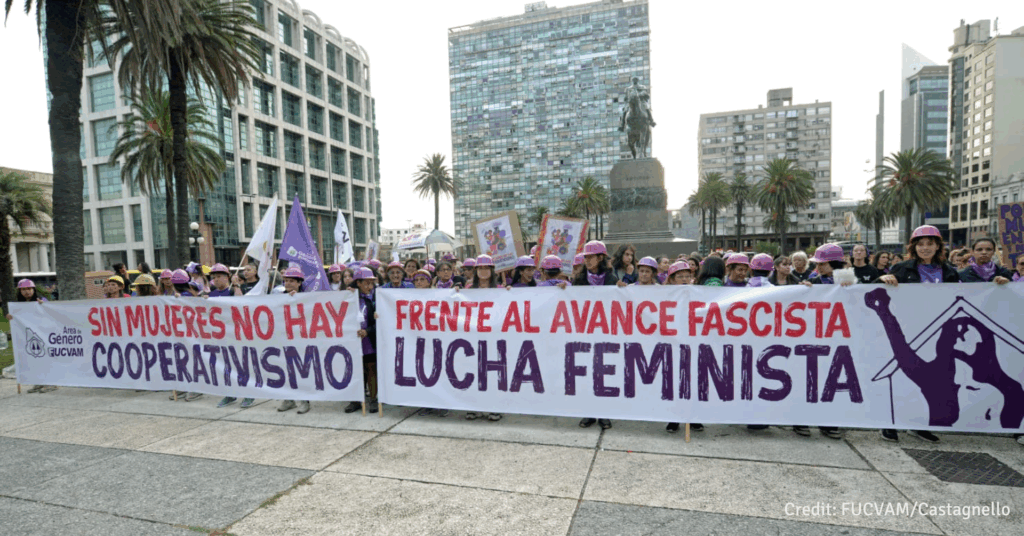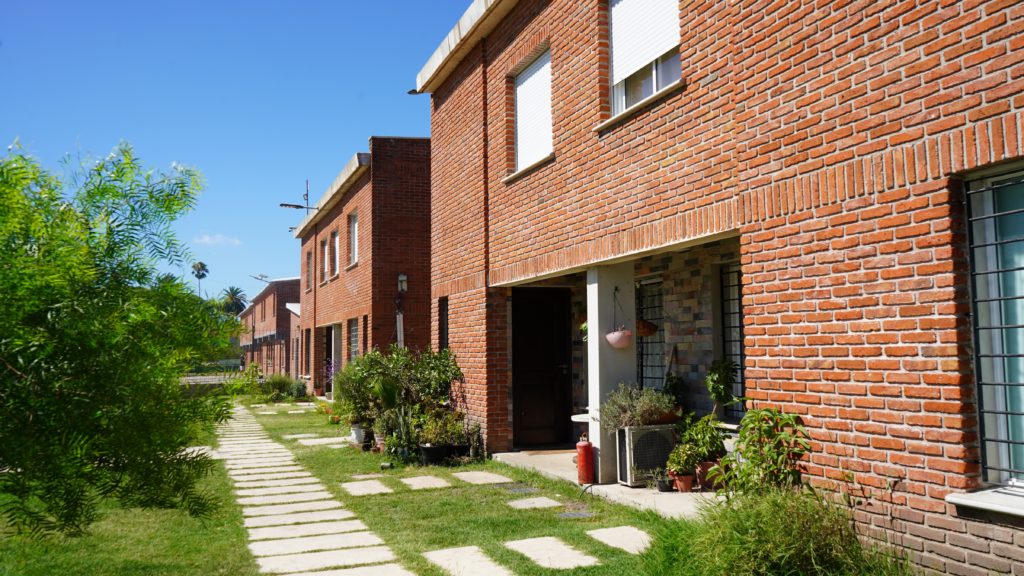Field visits to FUCVAM, ENFORMA, Area de Género and housing cooperatives
In February 2025, Léa Oswald, our project manager, and Alessia Marcon, intern, travelled to Montevideo for a field visit with FUCVAM (the Uruguayan Federation of Housing Cooperatives for Mutual Aid), a partner of urbaMonde since 2016. During their mission, they participated in numerous meetings and exchanges, followed the activities run by the National Training School (ENFORMA) and the Gender Area, and visited several housing cooperatives.
The FUCVAM project: a solidarity model in the face of the housing crisis
In a global context where the right to housing is under pressure, the CVAM cooperative model—based on mutual aid, collective ownership, direct democracy, and self-management—stands out for its ability to build solidarity while meeting housing needs. The evolution of the cooperative movement in Uruguay shows that ongoing training is a key lever for the sustainable development of cooperatives. This partnership, nearly ten years in the making, is now entering a third phase, with two main goals: to consolidate internal training within cooperatives according to the CVAM model and to support concrete actions in favour of women’s rights and gender equality. The main workstreams focus on empowering ENFORMA and strengthening women’s agency, notably through support for the Gender Commission (an internal body within FUCVAM).
The National Training School (ENFORMA): ongoing reflection
ENFORMA’s approach, based on popular education, is characterised by its commitment to co-constructing knowledge and developing collective awareness among cooperative members. Through its educational activities, ENFORMA deepens understanding of cooperative issues while positioning itself as a reference point for strengthening the empowerment and training of cooperators.
Silvina, a school member, shares: “Once you get involved, you can’t do without it. At the beginning, you absorb mainly the technical aspects—the assembly, the board, the functioning—but little by little, you understand that you carry an ideology. It’s a process that is built by doing, through exchange, through connections. Every workshop is an opportunity, and you gain something each time.”
ENFORMA’s working method relies on the habit of collectively reflecting on daily practice. It is not only a process of continuous improvement but also a way to deconstruct anti-cooperative behaviours and reflexes, to better understand and address them. More than a place of transmission, ENFORMA positions itself as a space for social transformation, serving all those building concrete alternatives in daily life.
Maxi, who has attended the school’s workshops, describes the impact:
“The school isn’t a magic wand, but it acts like a bridge: it opens a space to acknowledge what crosses all cooperatives: tensions, conflicts, and learnings. These tools allow us to address not only structures but, above all, the ideas, the deep foundations of the cooperative model. Because without conceptual work, there is no real structure. It is a path that we build together, step by step.”
The most challenging part is finding people ready to commit fully: we’re all pressed for time, and in the hectic pace of daily life, it’s not easy to make space for collective engagement. You also need the desire to prioritise this type of process, which isn’t always a given in today’s society.
The Gender Commission: a space for engagement and care
Recognising that the development of solidarity, equity, equality, and horizontality within cooperatives is strongly impacted by gender inequalities, FUCVAM’s Gender Commission actively addresses these issues. Its primary focus areas include sexist violence and its structural causes; women’s representation and participation in political spaces; women involved in constructing their cooperatives; feminist struggles through history; the right to the city from a feminist perspective; feminist urbanism and economics, and more.
It is an impressive collective force: training spaces, mutual aid, prevention, and concrete projects to combat violence and promote a different vision of living together. The Commission’s work includes political advocacy to improve legal frameworks and achieve recognition of equal rights between men and women (such as efforts toward a co-ownership law); training and awareness-raising for cooperative members on gender-related inequalities; psychosocial support services for cooperative women facing domestic violence; and empowering women cooperativists.
As Analia, a long-time member of the Gender Area, explains: “The Commission was created in 2015, initially as a development commission, to respond to concrete issues encountered during cooperative development—task allocation, the role of women, and conflicts. Gradually, the space expanded, more and more compañeras got involved, and it became a collective struggle to assert our rights. It was absolutely necessary to create this space because inside cooperatives, the same inequalities we experience in society repeat. At FUCVAM, this perspective was missing. Today, it has become essential to think about a truly equitable organisation that recognises violence and burdens and seeks to transform them.”
Lucia, a compañera engaged in the Gender Area, emphasises: “It’s essential to build cooperatives that accept no form of violence. We move forward together, among women, but also with men. It is daily and transversal work.”
In recent years, within the Area, we have seen that more and more men are joining awareness workshops. Because to bring about change, you have to talk about it first, all together. This struggle for equality can only be collective, shared, and truly mixed.

Visits to the cooperatives
During the field mission, visits to the many cooperatives spread throughout Montevideo’s municipal area were, of course, a central part. Although cooperatives are also well established in more inland areas, this mission focused mainly on those in more urban neighbourhoods. Two visits especially stood out: El Hormiguero and Basquadé.
At the El Hormiguero cooperative, during our project manager’s previous field mission, the construction site was still underway; this time, it was possible to see the finished results: completed, inhabited, living homes. Seeing the work finished gives whole meaning to the process by enabling a tangible measure of the impact of the effort.

As for the Basquadé cooperative, meeting members in the midst of the construction phase was particularly powerful. These interactions allowed us to feel the full strength of their collective commitment. Meeting the cooperators who are building their homes with their own hands, and finally seeing the end of a long process on the horizon, is deeply inspiring. Their collective determination powerfully illustrates the social and human significance of the project.
Field missions help strengthen ties with partners, observe concretely what is being achieved remotely, and further highlight the importance of continuing to support projects and collaborate with diverse experiences by promoting exchange and knowledge sharing. Through visits to cooperatives in Montevideo, we have seen how essential everyday collective work rooted in living spaces is to sustaining an alternative housing model. These encounters remind us that alternatives cannot be decreed: they are built, day by day, with patience, conviction, and solidarity. Change can begin in the places where we live. And it is there, in the concrete reality of cooperative struggles, that a more just and supportive world takes shape.
Alessia Marcon
